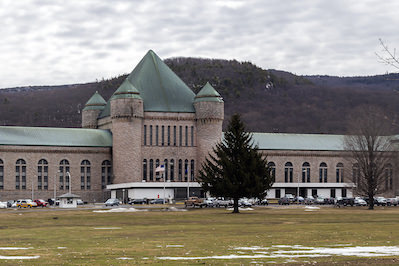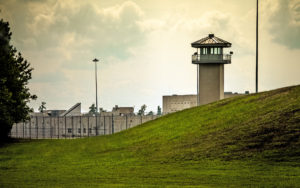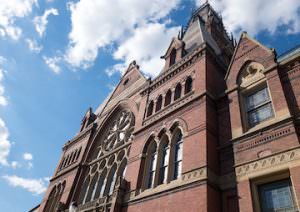Truthdiggers of the Week: The Bard Prison Initiative Debate Team and Its Supporters
Since federal funding for prison education programs was eliminated in 1995, Eastern New York Correctional Facility has had one of the few U.S. programs granting college degrees to prisoners. Recently, it produced an underdog story that made headlines. The members of the three-man team that defeated Harvard's debaters in September are incarcerated in the Eastern New York Correctional Facility, above. (A photo in this space earlier pictured debaters from the prison who defeated the West Point team in 2014.) (Acroterion / CC BY-SA 3.0)
The members of the three-man team that defeated Harvard's debaters in September are incarcerated in the Eastern New York Correctional Facility, above. (A photo in this space earlier pictured debaters from the prison who defeated the West Point team in 2014.) (Acroterion / CC BY-SA 3.0)
Every week the Truthdig editorial staff selects a Truthdigger of the Week, a group or person worthy of recognition for speaking truth to power, breaking the story or blowing the whistle. It is not a lifetime achievement award. Rather, we’re looking for newsmakers whose actions in a given week are worth celebrating.
How long before Hollywood comes calling for the right to tell the underdog story of the New York prisoners who beat an award-winning team of Harvard undergrads in a competitive debate?
The drama reached its climax recently when, after four months of preparation, debaters from the Bard Prison Initiative at Eastern New York Correctional Facility convinced a panel of veteran judges from Rutgers, Hobart and Cornell that they had made a stronger argument than the Harvard team.
The inmates were tasked with defending an argument they disagreed with: that public schools should be allowed to deny enrollment to undocumented students. One of the judges told The Wall Street Journal that the Bard team made the case that schools serving undocumented children often underperform and that if these institutions were permitted to refuse enrollment, nonprofits and wealthier schools might step in and offer the excluded children better educations.
The Harvard team lost gracefully. A comment posted to members’ Facebook pages after their loss read: “There are few teams we are prouder of having lost a debate to than the phenomenally intelligent and articulate team we faced this weekend, and we are incredibly thankful to Bard and the Eastern New York Correctional Facility for the work they do and for organizing this event.”
As the homage from the Ivy Leaguers attests, the prison team is making a name for itself. It has developed a friendly rivalry with West Point military academy, having won one match and lost another; it has also beaten the University of Vermont.
Since federal funding for prison education programs was eliminated in 1995 under the Clinton administration, the Bard Prison Initiative has been one of the few programs granting college degrees to U.S. prisoners. Aiming to give students a liberal arts education that enables them to find rewarding work when they re-enter society, it offers more than 60 academic classes each semester at campuses at six medium- and maximum-security prisons in New York state. Funded by private donors, the program is competitive—10 inmates apply for each available spot. Academic criteria are those that prevail in standard universities. The Eastern debaters were taking full course loads as they prepared for the Harvard match.
“The purpose of work is not to reform criminal justice per se, but to engage and to relate to people who are in prison, who have great capacity and who have that dedication and willingness to work hard … ,” said Max Kenner, founder and executive director of the program.
In a piece in The Guardian that explored the meaning of Eastern’s victory, a British former prisoner, Carl Cattermole, described the appeal and virtue of education behind bars:
Educational classes in prison offer training to those who’ve often been alienated from school the first time around. Prison classrooms turn the dynamic on its head: in a room full of bad boys you don’t stand out by being bad so everyone is trying to prove themselves with academic achievements. Through this engagement you can feel prisoners’ empowerment and self-confidence growing by the minute. As one of the New York prison debaters, Carlos Polanco, put it, the course helped them to “believe in themselves”. It’s a shame, then, that the powerful aura of an education department in an otherwise grim prison experience has been hit hard by the combination of our [Britain’s] current austerity programme and a demand for immediate quantifiable results.
Cattermole highlighted a statistic that should convince everyone of the worth of prison education programs, not just to inmates seeking confidence and self-development but to members of the public seeking safety against crime: Among Bard students who earned degrees while in custody, fewer than 2 percent returned to prison within three years, compared with New York state’s decades-long recidivism rate of about 40 percent.
That figure alone is not proof of the program’s effectiveness. Inmates inclined to enroll in a liberal arts program may generally be less likely to repeat crimes that would land them back in prison. But the program is a must for any decent society. People who wish to improve themselves should be given the chance, regardless of what they did in the past. David Register, the academic who led the debaters, wrote in The Guardian that one of the program’s goals is to enable the students to “learn how to engage in their own governance.” Many of the debaters “openly express the desire to someday make positive contributions to society,” said Register, who added that he has “no doubt that they will.”
The Eastern debate team and everyone who contributed to its success are our Truthdiggers this week.
Your support matters…Independent journalism is under threat and overshadowed by heavily funded mainstream media.
You can help level the playing field. Become a member.
Your tax-deductible contribution keeps us digging beneath the headlines to give you thought-provoking, investigative reporting and analysis that unearths what's really happening- without compromise.
Give today to support our courageous, independent journalists.




You need to be a supporter to comment.
There are currently no responses to this article.
Be the first to respond.